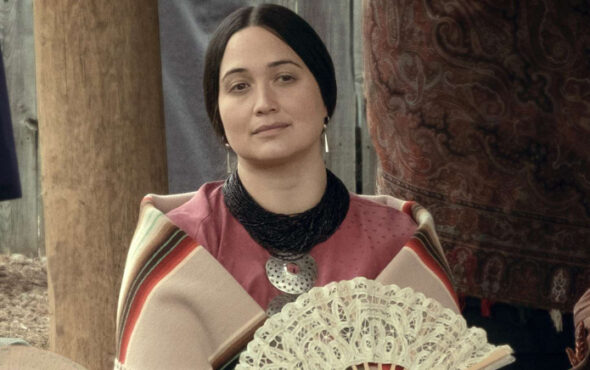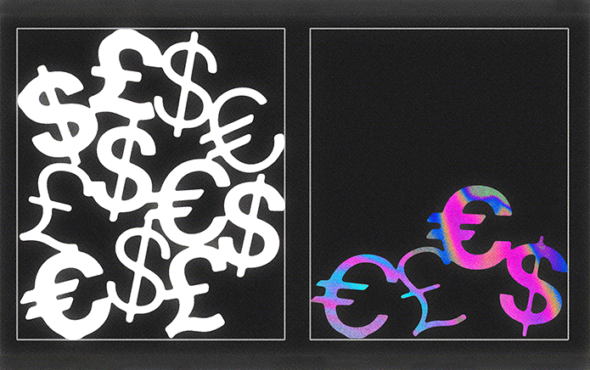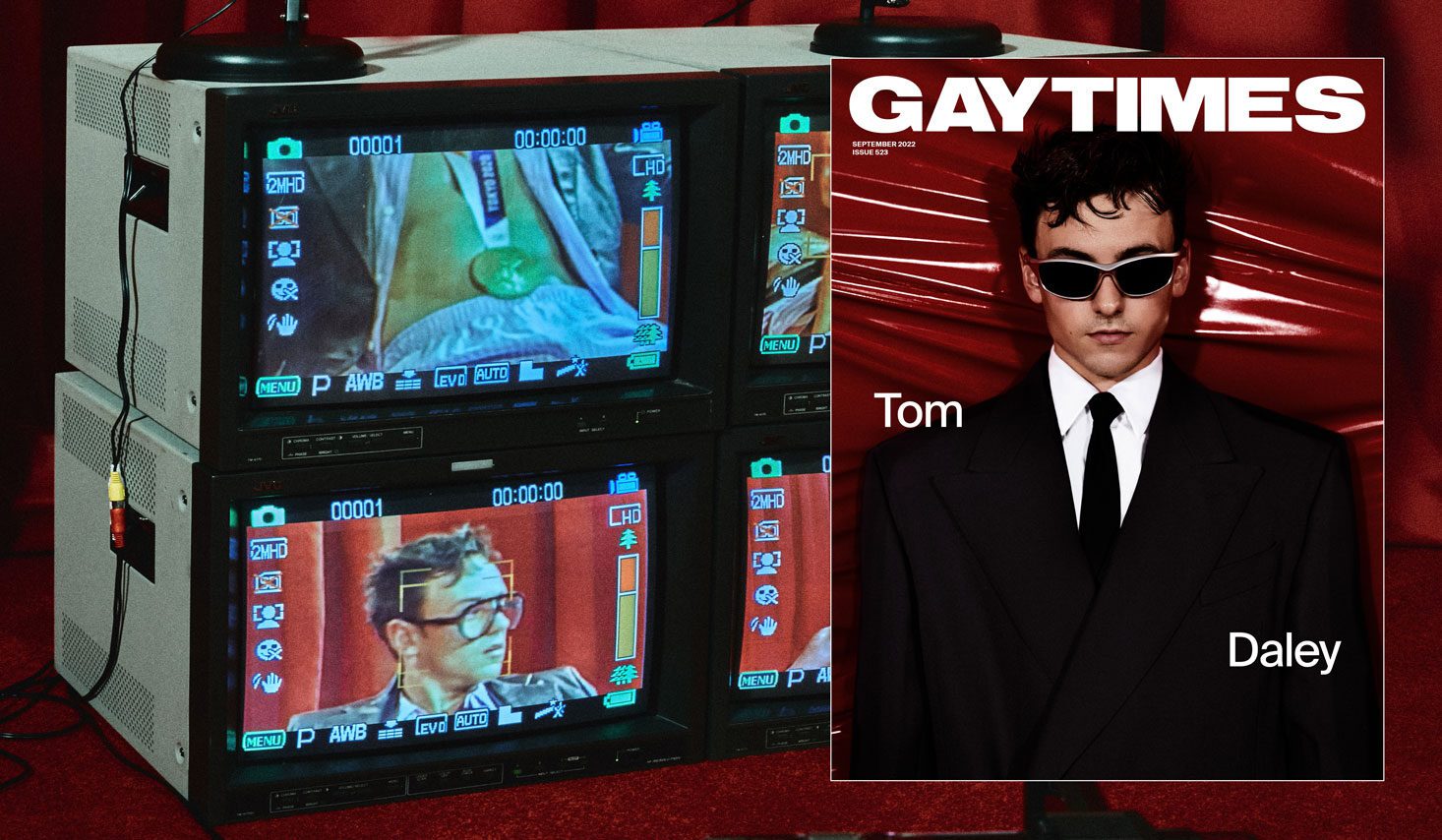
Tom Daley may have taken a year-long break from diving, but that doesn’t mean he’s slowed down. If anything, the Olympic gold medallist is busier than ever. “Sorry I’m late,” he says as he joins our Zoom call, fixing his hair and catching his breath. He’s just been out for a walk with his husband Lance to get his laptop fixed. “Long story short, Robbie knocked over a margarita on it,” he explains, clearly still enjoying the joys of fatherhood despite flying cocktails causing tech carnage.
When we speak it’s been four days since Tom ran into the Alexander Stadium in Birmingham for the Commonwealth Games 2022 Opening Ceremony, contributing to the final steps of the Queen’s Baton Relay. Behind him were four flag bearers making history. In their hands they waved the Intersex-inclusive Progress Pride Flag proudly to huge cheers from the crowd. It’s the first time the Commonwealth Games – or any major sporting event – has included such a prominent and visible statement of solidarity for the LGBTQ+ community in their opening ceremony, and it was broadcast to an estimated audience of 1.5 billion people across the Commonwealth. But this moment was never a given. It was fought for.
“It wasn’t the easiest thing to get across the line because initially they were quite resistant about having it take such a prominent part in the ceremony,” Tom tells us, reflecting on the history-making moment. “Then when they did agree to it it was very much a stripped back version, but I was very insistent on making sure that it wasn’t me just carrying the Pride flag. The Queen’s Baton Relay and bringing it into the stadium is one thing, but that moment wasn’t just for LGBTQ+ people in the UK, but for all the LGBTQ+ people across the Commonwealth. The flag bearers were there representing all of the queer kids where their existence is illegal, and their existence is persecuted with jail time and even in some countries the life sentence and death penalty. It was a very emotional moment and I think for the 1.5 billion people around the Commonwealth who tuned in, maybe it gave hope to some kids somewhere that maybe one day they can be free too.”
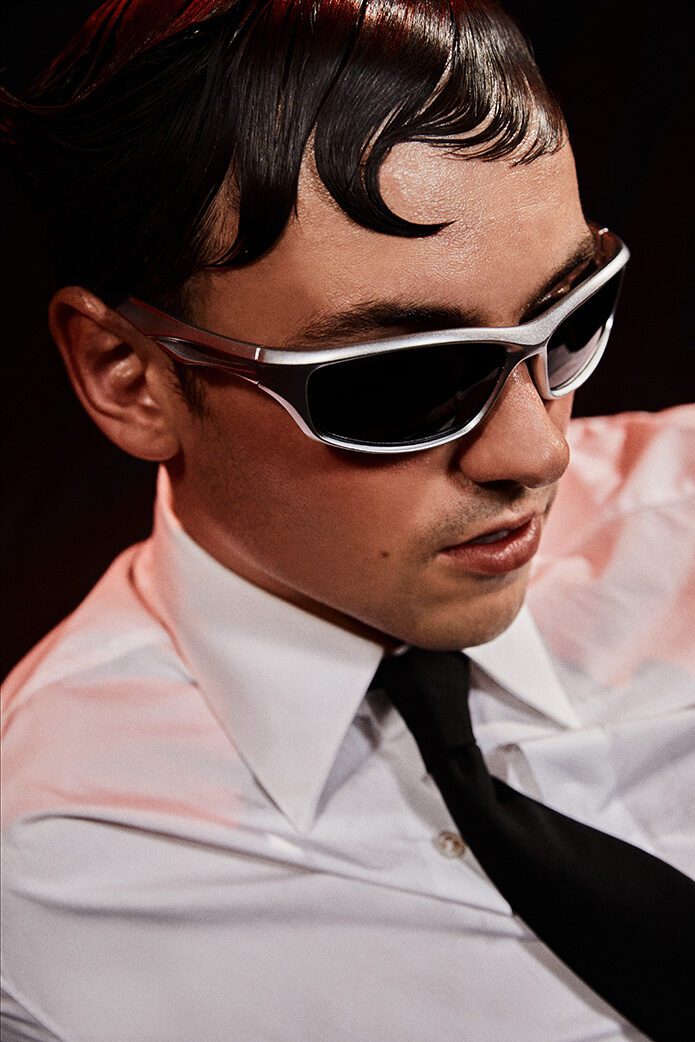
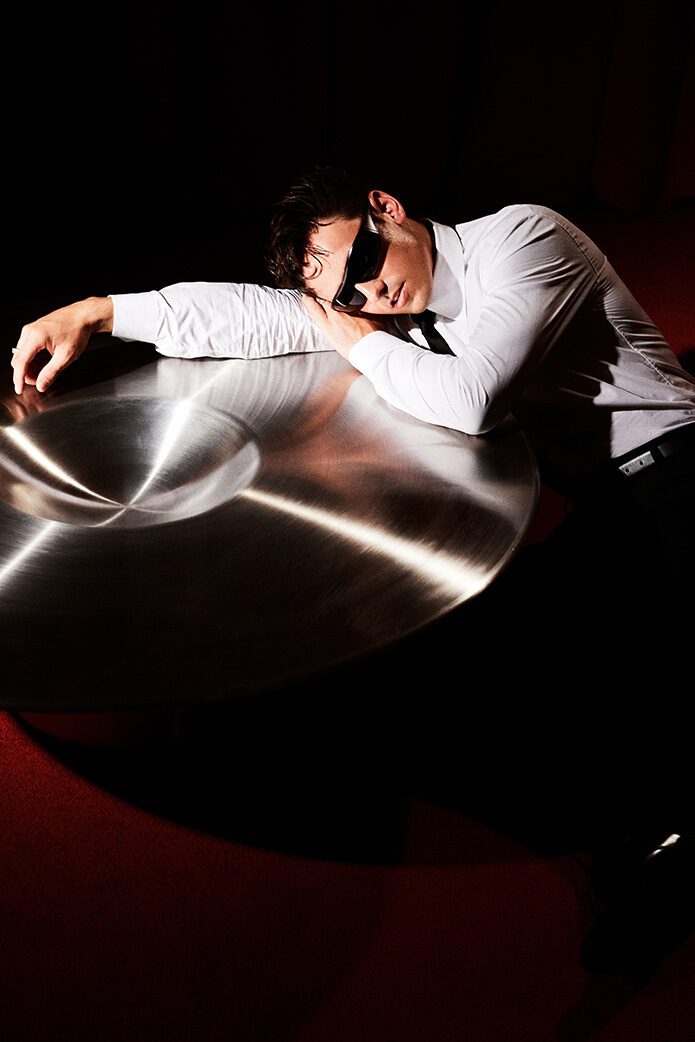
A year earlier Tom was fresh from his victorious gold medal win in the 10m synchronised diving. Despite the 2020 Olympic Games hosting the most openly LGBTQ+ athletes ever, Tom was aware that more needed to be done by sporting federations to apply pressure on countries where LGBTQ+ people face grave legal and social challenges to their existence. He began to speak more confidently about his own role in pushing forward that change, making statements on how countries that criminalise LGBTQ+ lives should be banned from being able to host international sporting events. His thinking was that by doing so, legislative reform could potentially happen more swiftly and offer both hope and protection to LGBTQ+ citizens most at risk.
Homosexual activity remains illegal in 35 of the 54 nations that make up the Commonwealth. In Brunei and Northern Nigeria the maximum punishment is the death sentence, whereas Ghana, Pakistan and Uganda are part of 11 countries that enforce prison sentences. The remaining 22 countries where homosexuality remains illgeal, punishment is rarely enforced. However, societal attitudes means LGBTQ+ citizens cannot live freely without fear of discrimination and violence. They also have little to no protections when it comes to housing, healthcare, employment and safety. We’ve seen progress in recent years with Botswana, Guyana, and India all striking down colonial era penal codes that criminalised homosexuality. Since the Commonwealth Heads of Government Meeting in 2018, Kaleidoscope Trust’s 2022 review looking at the changes in country-level commitments to LGBTQ+ people since then found that 10 countries had positively reformed laws to better protect their LGBTQ+ citizens. However, that is outweighed by 16 country-level negative setbacks, and a decrease in safety for LGBTQ+ people across the Commonwealth.
Much greater public awareness of these horrific challenges that LGBTQ+ people face across the world is needed, but also a better understanding of why these societal and cultural attitudes exist in Commonwealth nations in the first place. On a mission to shine a spotlight on the homophobia across the Commonwealth, as well as the British Empire’s role in imposing it, Tom has worked with the BBC on a new documentary that aims to educate audiences as part of a bigger process to achieve positive change. “Going into it I thought banning countries with anti-LGBTQ+ laws from hosting [the Commonwealth Games] was going to be it,” Tom tells us for his first-ever GAY TIMES Magazine cover story. “I go on this journey of being, ‘Actually that’s probably not the best way to go about it.’ I felt like there was so much more to this than campaigning behind closed doors and being able to follow the journey can bring with it a little bit of weight. Without the documentary, I don’t think the Commonwealth Games would have agreed to do what they did at the Opening Ceremony. I had to pull the, ‘OK, that’s fine, if you don’t want to do it I just have to reflect that truth in the documentary.’” Tom is frank about the resistance he’s faced from sporting bodies throughout this process, highlighting that garnering support for marginalised LGBTQ+ communities is still tough in the world of sport. “It was actually the president of the Commonwealth Games Federation that stepped in in the end and she was like, ‘Nope, we’re going to do it. We’re going to make it work.’” Tom says. “That was a really big move and it was amazing to see Dame Louise [Martin] do that.”
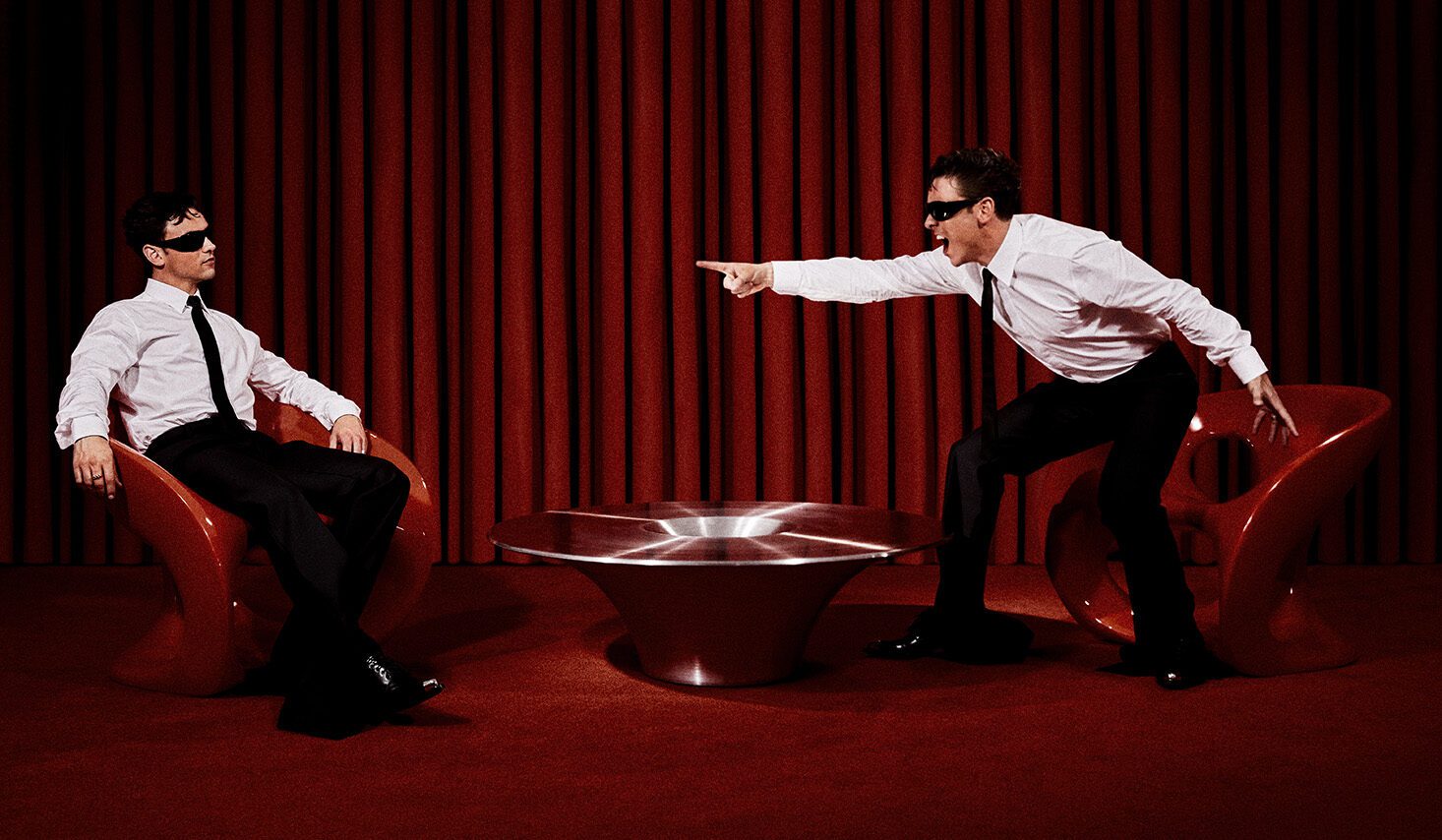
Tom Daley: Illegal To Be Me is available to watch on BBC iPlayer now and sees the athlete travel to Commonwealth nations in a bid to create a first-of-its-kind manifesto of action points for the Commonwealth Games to help progress global LGBTQ+ protections. Tom travels to Pakistan and Jamaica in the film, speaking with athletes and activists about the history, reality and challenges of queer people in their nations. He admits that he was “nervous” at first. “Obviously I know I am a very privileged white gay man and to be able to start having those conversations was difficult for me because I wanted to highlight those things and speak about them, but I didn’t know if I was necessarily the best person to bring those to light,” he says. “Having spoken to a lot of people, they were saying they’d never be able to get a manifesto or their thoughts and points into the room with the president of the Commonwealth Games Federation, so actually that manifesto is all of the things they had said should be put into it.”
Tom worked with brilliant organizations such as Kaleidoscope Trust, Rainbow Railroad, and Micro Rainbow to make sure he was speaking with the right people, asking the right questions, and ensuring the film achieves what it sets out to do. There was also the crucial aspect of making sure those speaking on camera remained anonymous and the production went to great lengths to ensure their safety. “I didn’t know their names, all I knew was their achievements,” Tom explains. “One that was particularly high profile came in with a hoodie, mask, sunglasses and was completely unrecognizable. Some athletes in Jamaica were less worried about that. Again, I didn’t know their names so there was no way I’d even be able to say it on tape if the footage got into the wrong hands. Their faces were never actually filmed either. Everything was either out of focus or filmed from the back, and the crew and production team were very conscious of that.”
Illegal To Be Me doesn’t shy away from the fact that Tom is very much on a journey too. His original suggestion that nations who criminalise homosexuality should be banned from hosting major sporting events is dismissed by all of the activists he proposes it to. They give him the reasons why – the main one being that homophobic countries would then double down on their LGBTQ+ citizens, blaming them for the lost opportunity to host events – and Tom takes it on board and develops his own approach towards progress. The film also highlights the reason why many of these countries have anti-LGBTQ+ laws in the first place: the British Empire. Much of the homophobic legilsation is a hangover from colonial era laws put in place by the British. To understand why these laws still exist, you need to confront Britain’s history of colonialism and slavery. “British schools don’t teach colonialism and Black history very well at all and more needs to be done about that,” Tom says. “That is the great thing this film does, is that it brings together and highlights the importance of knowing that history.”
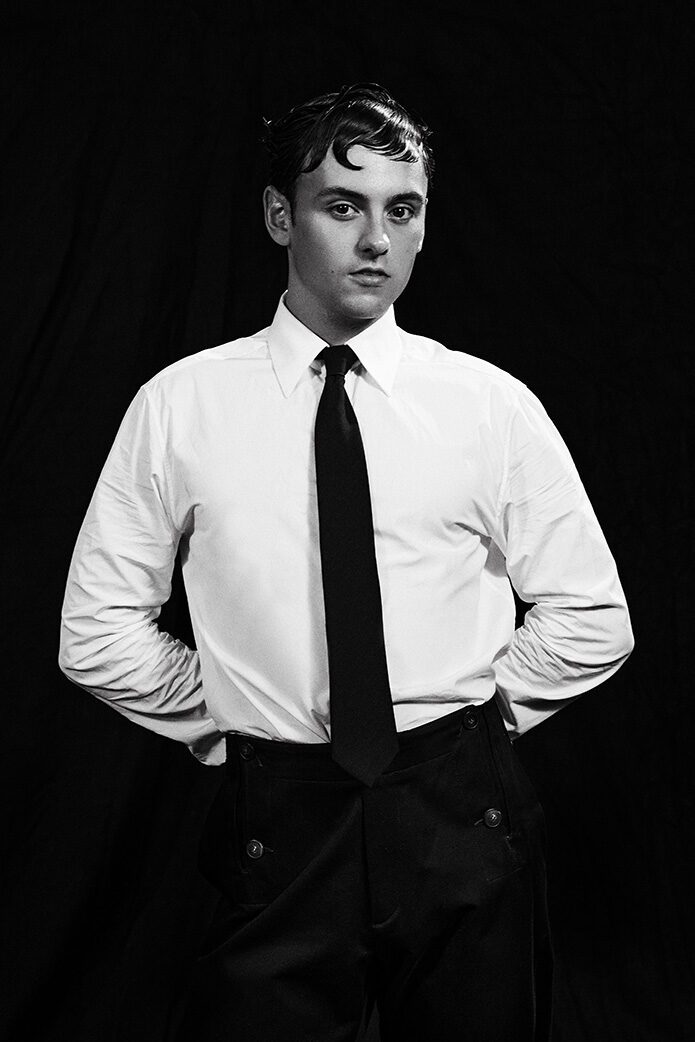
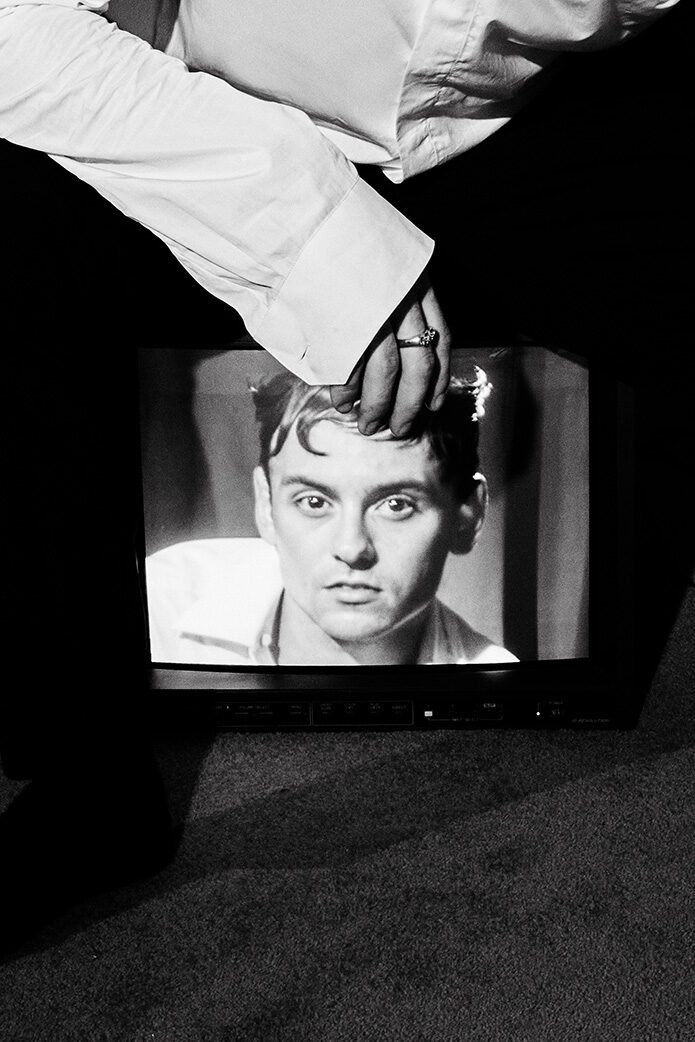
That moment wasn't just for LGBTQ+ people in the UK, but for all the LGBTQ+ people across the Commonwealth.
When visiting Jamaica, Tom spoke with Carla Moore who has been researching the link between homophobia in the country today and the slave trade. She explains that gay sex wasn’t allowed on the British-owned platations because that wouldn’t result in a child, which would deny the owners future slave labour. There was also the use of anal rape as a punishment for enslaved men, which resulted in a history of sexual trauma that spanned around 300 years. This instilled the idea that gay sex is something that white people use to harm Black victims, which has directly contributed to the homophobia that still exists there today. “I knew certain history around slavery, but never understood the relationship between using sodomy as a form of punishment and that further reinforcing it,” Tom says. “I was almost embarrassed by how much… I think the more I learned the more I realised I didn’t know. Obviously you can’t know everything about everything, but you still feel like ‘Oh my gosh, how could I have not known this, been told this, been made aware of this?’ I initially felt quite guilty and the professor says in the documentary, ‘Guilt is the first step, but then what are you going to do about it?’ That really triggered this thing inside me where I came out with anger and felt frustrated for so many communities within our community, and people who don’t necessarily get listened to or don’t get a space at the table to have this conversation. I just wanted to be able to bring as many voices to the table. To have true representation, and true diversity and inclusion, it has to include everyone.”
The UK has a real problem with acknowledging its role in imposing anti-LGBTQ+ laws in countries far beyond our shores. There’s a resistance to accept that the British Empire was an awful era for so many countries and their peoples. And the UK can’t claim to be as progressive as they say they are after centuries of opressing queer people both at home and abroad. Very few people are made aware of the atrocities of the British Empire when learning history in school. “Teaching facts is not persuading someone either way about anything,” Tom agrees. “People need to know the history to be able to have some kind of context around what is happening in the world, and to learn the history. It’s also about just acknowledging it and being able to highlight that this happened and it was really shitty and until the British public and everyone can acknowledge that it happened and talk about it, how can anybody heal from that? How can anyone heal from anything without actually confronting it? That was the big thing from a lot of the advocates and activists, that they need this acknowledgment and not to be labelled as the homophobic ones when Britain is the reason for it. We are the ones who implemented those laws in the first place.”
With two months to go before the Commonwealth Games 2022, Tom returned to the UK armed with all of the requests from athletes and activists across the Commonwealth to build a manifesto for positive change. They include a pro-LGBTQ+ stance at the forefront of the Commonwealth Games ethos; educational programmes around the British Empire and its role in imposing anti-LGBTQ+ laws; sensitivity training for staff and volunteers; refugee resources that allows people to start seeking asylum in the country that is hosting; and the big one that cropped up continuously, to have the Pride flag play an official part of the Opening Ceremony.
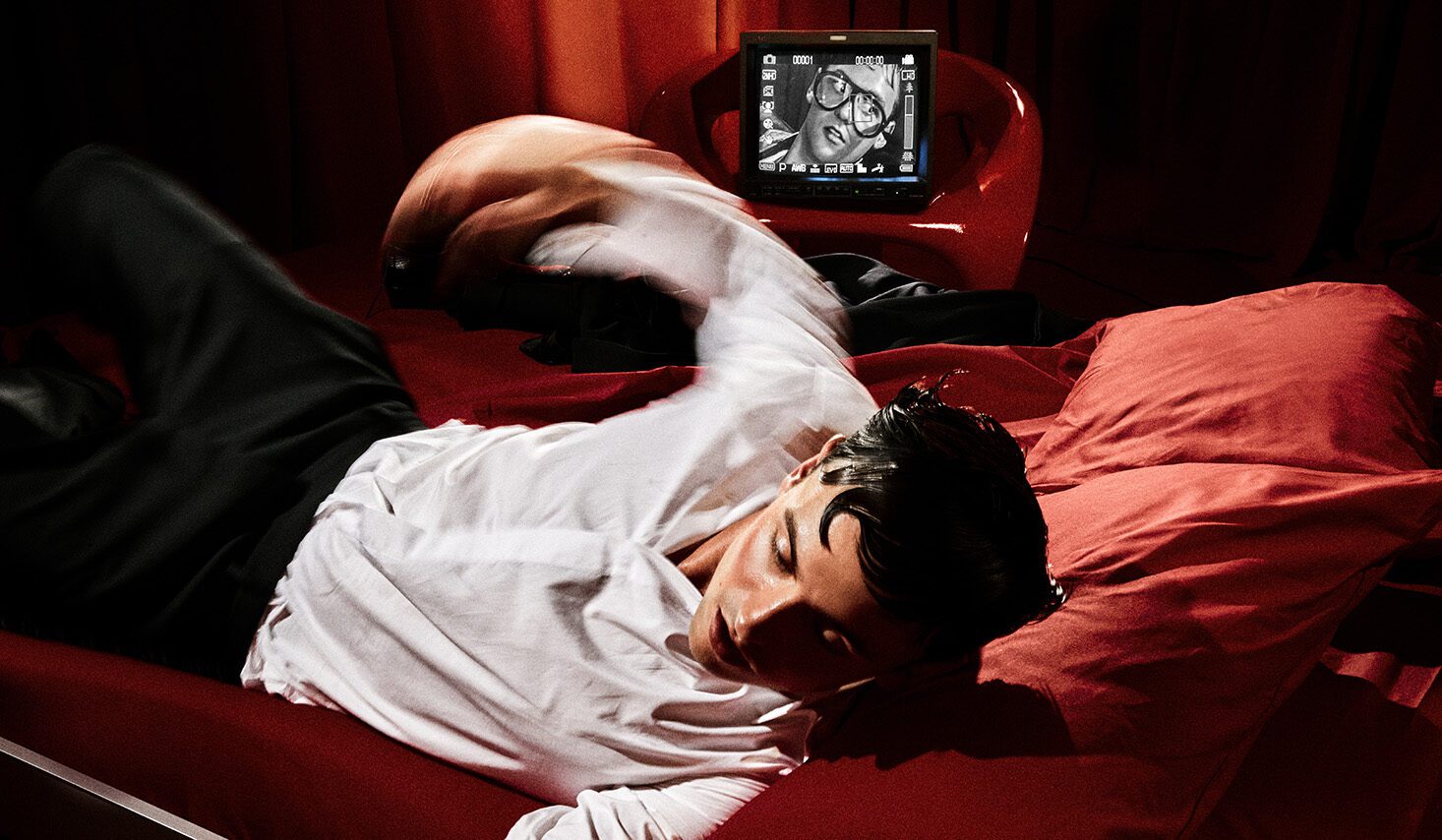
Billions witnessed that final point become a reality on 28 July, marking a new beginning for LGBTQ+ visibility and solidarity at the Commonwealth Games. Tom says that some more of the points have already been implemented too, and he’ll continue to work with the Commonwealth Games Federation to complete this manifesto. “They’re the first sporting body to engage in that way and I think the big thing about this documentary is I didn’t want it to be ‘here’s everything that is terrible and we’re not going to do anything about it’,” he adds. “There is a campaign element behind it and things will continue and the Commonwealth Games is just the start. If the Commonwealth Games can do it, why can’t FIFA? Why can’t the Olympics do it? There is a possibility that something like that could be pushed forward.”
LGBTQ+ protections in sport are needed now more than ever. In just the past month in the United Kingdom we’ve seen FINA ban trans female swimmers from competing and Rugby Football Union blocking trans players from participating. It places the UK as a Commonwealth nation who is also targeting sections of the LGBTQ+ community in a merciless fashion. It’s the result of a right-wing agenda to spread disinformation and fear of trans people in general. “Sport is a space for everyone, no matter your gender, no matter your sexual orientation, no matter your religion, no matter your socio-economic background, ability, disability, you should be able to see yourself enjoying sport and getting involved,” Tom says passionately. “It’s social, it’s a way of staying healthy, it’s a way of learning discipline, there’s so many different things that sport is amazing for. The fact that people are honing in on, let’s say the NCAA [National Collegiate Athletic Association], there’s maybe five athletes out of thousands that identify as trans, it’s sometimes sensationalised in a way that isn’t fair on trans people. They are never given the opportunity to be able to share their side of the story in the same way that everyone else is. Above all else, sport should be for everyone and I don’t think anyone should ever be excluded from sport. It’s obviously a very nuanced subject, but there’s more to be learnt and there is going to be a period of time where we figure that out. But in the meantime, just banning people is… I don’t know… Just imagine being that 12-year-old kid who’s told that unless you get on hormone therapy right now you are never going to be able to compete at the Olympics in swimming. That puts so much pressure on them and the parents.”
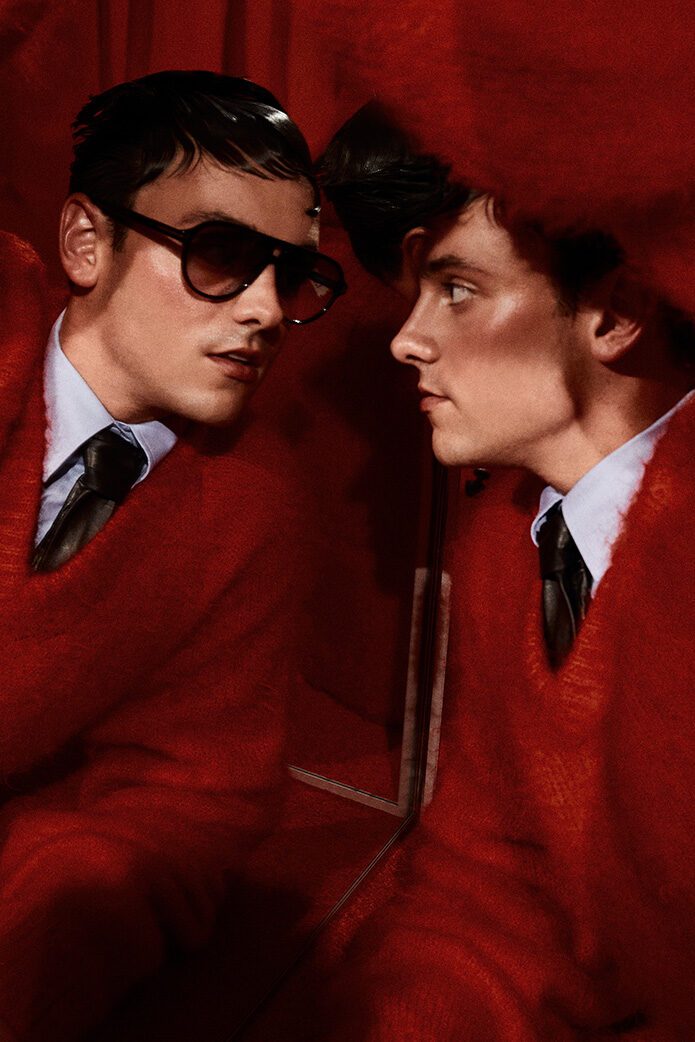
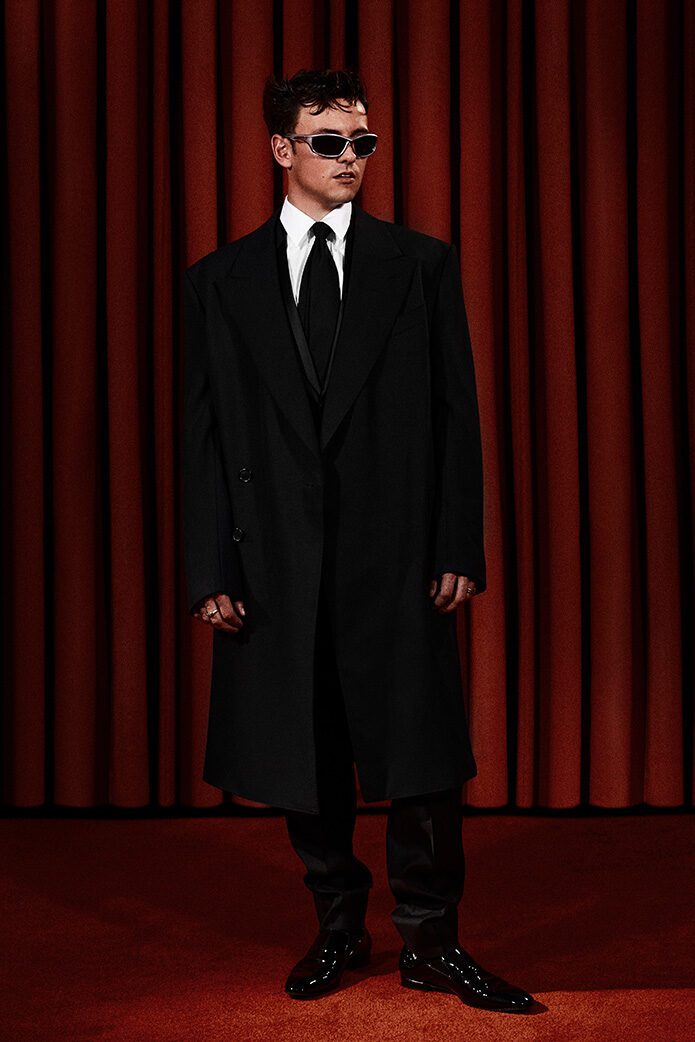
In Tom Daley: Illegal To Be Me, the athlete reflects on his own coming out journey back in 2013. He admits that when he first made the public aware of his sexual orientation he remianed quiet because he felt like he didn’t know anything and was uncertain around how things were going to go down. But over the years he’s emerged as one of sport’s most visible and vocal LGBTQ+ stars – and now feels it’s his duty to campaign to make it an inclusive space for everyone. “It’s important to be able to use your voice and platform to be able to stand up for people who otherwise can’t. I am part of a community that is marginalized and has been discriminated against for a very long time,” he says. “One thing I do think the LGBTQ+ community needs to try and do is all come together. There’s power in numbers. It’s very difficult when there’s lots of different thoughts, feelings and opinions within that community. The right wing knows what they’re doing. They sensationalise things and create arguments and fights within a community to be able to then divide and conquer. That’s not what we should be about. We should be about lifting up and being really supportive of everyone. That’s what we need to get back to.”
Tom is currently coming to the end of his year-long break and says he will meet with his coach at the end of August to discuss the future of his diving career. No decision has been made yet on whether he will compete in the upcoming 2024 Olympic Games in Paris. “The diving thing is always there and I need to figure out exactly what I’m going to do with that,” he says. Making Illegal To Be Me has taken up a good chunk of his time, but he’s also had a moment to enjoy life and explore his other passions. He launched his new knitwear line Made With Love and has had the opportunity to lean into the world of fashion. “I’ve always loved fashion and the interesting thing with taking this year off is that I’ve actually been able to wear things that aren’t just sports clothes!” he laughs. “I actually go to places now! Lots of people have been like, ‘You’re wearing all this stuff’ and I’m like, ‘Well it’s because I’m allowed to leave the house! I don’t have training and I don’t have to be in bed at 8pm’. So it’s been really fun to be able to express myself in that way.” He has big ambitions in that world too, with plans to learn how to sew and hopefully take his designs to the runway. “I’d love to, in the next 10 years, get to a point where I could have a London Fashion Week show with Made With Love. You’ve got to dream big I guess!”
Whatever decision Tom makes about his future diving career in the coming months, one thing remains clear: he will continue to campaign for greater LGBTQ+ visibility and protections for people everywhere. He’s just become a patron of Kaleidoscope Trust alongside Munroe Bergdorf, Michael Gunning and Kyle De’Volle – supporting the vital work they do to fund, fight for and empower those upholding the human rights of LGBTQ+ people across the globe. From the young man grappling with his own coming out fears to a global sportstar putting his platform to good use, he’s come a long way. But things are about to get even busier, as he dives into a promising and purposeful future ahead. We’ll toast a margarita to that.
